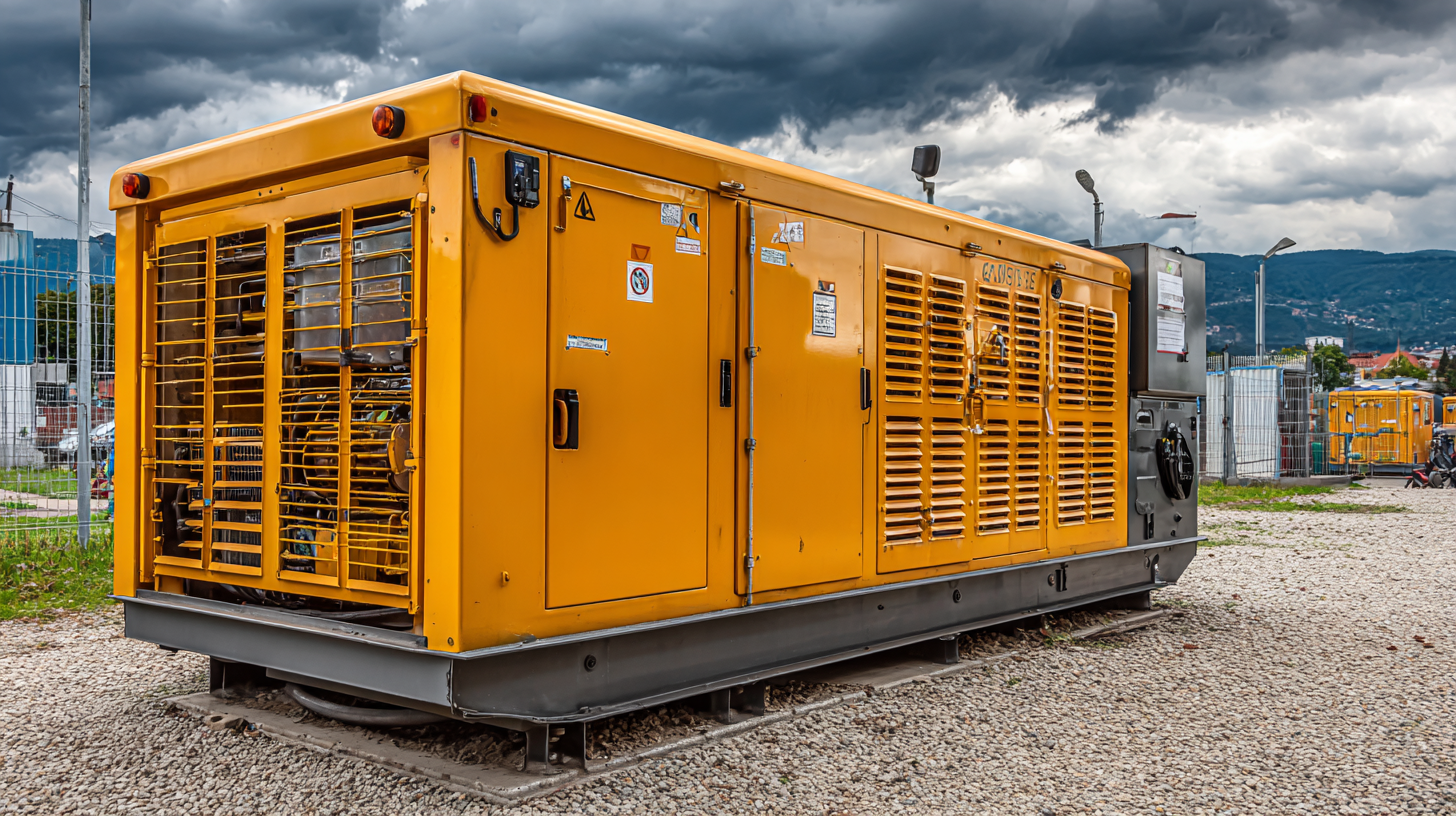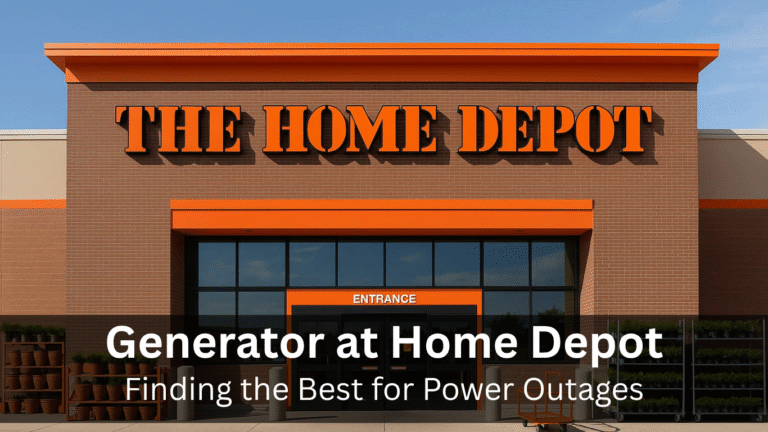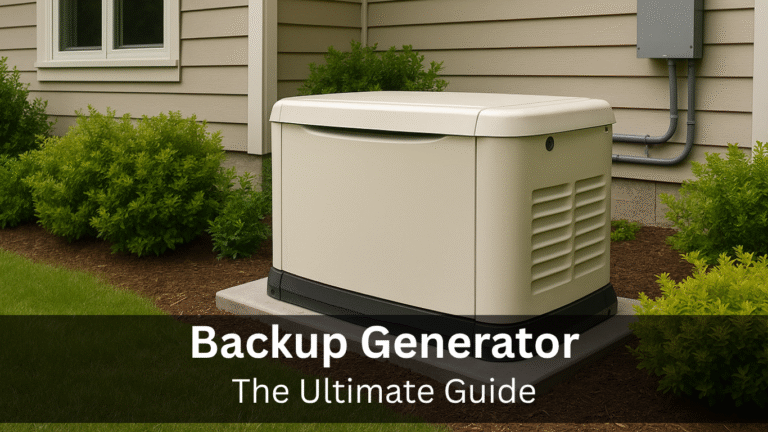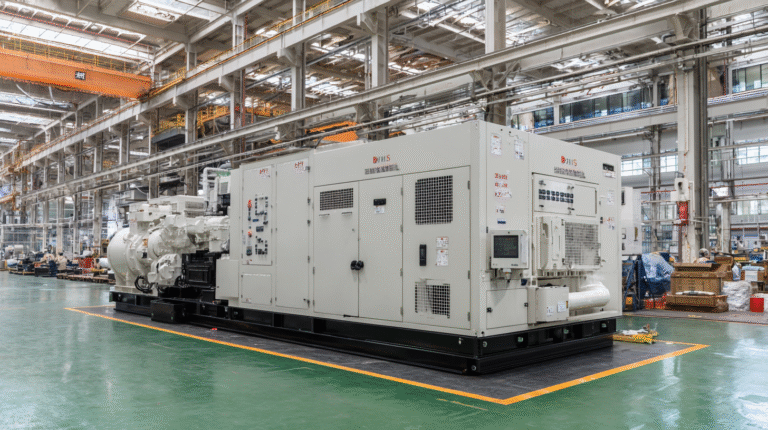Quiet Power: Your Guide to Silent Diesel Generators
We all need power, right? It keeps our lights on, our businesses running, and our lives moving. But let’s be honest, traditional generators can be really loud. Like, ‘can’t hear yourself think’ loud. That’s where the silent diesel generator comes in. It’s basically a generator that’s been designed from the ground up to be much, much quieter. Think of it as a power backup that doesn’t announce its presence to the entire neighborhood. This guide is all about understanding these quiet workhorses and why they’re becoming so popular.
Key Takeaways
- A silent diesel generator is built to produce electricity with significantly less noise than standard models, often using soundproofing and special mufflers.
- These generators can run for extended periods, typically 10-18 hours on a single tank, making them efficient for continuous operation.
- The main advantage is reduced noise pollution, which improves quality of life and helps meet environmental noise regulations.
- When choosing one, consider your power needs, how portable you need it to be, and look at brand innovations in quiet technology.
- Proper engine design, effective cooling systems, and regular maintenance are key to keeping a silent diesel generator running smoothly and quietly for a long time.
Understanding The Silent Diesel Generator
The Universal Need for Power, The Common Problem of Noise
We rely on electricity for pretty much everything these days. From keeping the lights on at home to making sure businesses can operate without a hitch, a steady power supply is a big deal. When the power goes out, it can really mess things up and cost money. Traditional generators can help, but they often come with a major drawback: noise. So, we’ve got this double challenge – needing power when the grid fails, but also dealing with the racket generators make. This is a growing issue everywhere, in neighborhoods, workplaces, and construction sites. That’s where the silent diesel generator steps in. It’s a smarter, quieter way to get reliable power.
What Is A Silent Diesel Generator?
A silent diesel generator is basically a diesel generator that’s been specially designed to run much more quietly than a standard model. Think of it as a regular diesel generator that’s had a serious upgrade in the noise-reduction department. These units are built with soundproofing materials and enclosed in a special casing to keep the sound contained. This makes them ideal for places where noise is a problem, like residential areas, hospitals, or offices. They work on the same basic principle as any diesel generator – an engine driving an alternator to make electricity – but the key difference is all the work done to keep the noise down.
How Does A Silent Diesel Generator Work?
At its core, a silent diesel generator functions just like a conventional one. A diesel engine burns fuel to spin an alternator, which then generates electrical power. The magic behind its quiet operation lies in several key design elements. These generators incorporate robust diesel generator soundproofing techniques. This includes a heavily insulated enclosure, often lined with sound-absorbing materials, to trap engine noise. Special attention is paid to the exhaust system, which features a larger, more effective muffler to significantly reduce exhaust noise.
Additionally, vibration dampening mounts are used to isolate the engine and generator from the frame, preventing vibrations from being transmitted and amplified. Even the cooling fan is designed with aerodynamic blades to minimize air movement noise. These combined features create a noise reducing diesel generator that operates at much lower decibel levels, often making them suitable for sensitive environments. For example, some models can operate as low as 65 dB, which is comparable to normal conversation at a short distance. You can find more information on these types of generators at home generators.
Here’s a quick look at what makes them quieter:
- Soundproof Enclosure: A sturdy, insulated metal casing that wraps around the entire unit.
- Advanced Muffler System: A specially designed exhaust muffler that drastically cuts down on engine noise.
- Vibration Dampening: Rubber or spring mounts that absorb engine vibrations.
- Optimized Airflow: Carefully designed air intake and exhaust vents that reduce noise while maintaining cooling efficiency.
The goal is to contain as much of the engine’s natural operating noise as possible within the unit’s housing, preventing it from escaping into the surrounding environment. This attention to detail in design is what truly sets silent generators apart.
Key Features Of Silent Diesel Generators
When you’re looking at silent diesel generators, it’s not just about the quiet. There are several important things to check to make sure you get the right one for your needs. Think of these as the main selling points that set them apart from the noisier models.
Noise Reduction Technology and Decibel Levels
This is the big one, obviously. Silent generators use special designs to keep the noise down. They often have sound-absorbing materials all around the engine and a specially designed muffler. Most of these units operate somewhere between 55 to 75 decibels (dB). That’s pretty quiet, often compared to normal conversation. Choosing a generator with a lower decibel rating is key for residential areas or places where noise is a concern. It’s worth looking into manufacturers that really focus on making their units as quiet as possible, as this helps meet noise regulations and just makes life nicer for everyone around. You can find generators that are quiet enough for camping or powering your home without disturbing the neighbors.
Power Output and Runtime Efficiency
Just because they’re quiet doesn’t mean they skimp on power. These generators come in a range of sizes, from smaller units for backup power to larger ones for job sites. What’s really impressive is how long they can run on a single tank of fuel. Many can go for 10 to 18 hours straight, depending on the model and how much power you’re drawing. This means they’re pretty good at using the fuel they have, squeezing out as much power as possible. This is a big deal if you need a reliable power source that won’t need constant refueling.
Fuel Efficiency and Tank Capacity
Fuel efficiency is another area where modern silent diesel generators shine. The engines are often designed to be very economical with fuel. This not only means fewer stops for refueling but also lower running costs over time. The size of the fuel tank plays a big role here too. A larger tank means longer runtimes between fill-ups, which is super convenient, especially if you’re relying on it for extended periods. It’s a good idea to match the tank capacity and fuel efficiency to how long you expect to need backup power.
Diesel generators, in general, are known for their toughness and ability to handle rough conditions. They’re built to last, even when the weather isn’t great. This makes them a solid choice for outdoor use or in places that see a lot of weather changes.
Here’s a quick look at some typical specs:
| Feature | Typical Range |
|---|---|
| Noise Level (dB) | 55 – 75 dB |
| Runtime per Tank | 10 – 18 hours |
| Power Output (kW) | 5 kW – 100 kW (and higher for industrial) |
The Compelling Advantages Of Silent Operation
Substantially Reduced Noise Pollution
The most obvious perk of a silent diesel generator is, well, the quiet. Compared to their louder counterparts, these units can make a huge difference in how much noise actually reaches your ears. We’re talking about a reduction that can bring the generator’s sound down to a level that’s barely noticeable, especially when you’re a bit of a distance away. This isn’t just about making things less annoying; it genuinely improves the atmosphere around you. Think less stress, better concentration, and just a more pleasant environment overall. It’s a big deal, especially in places where noise really matters.
Improved Quality of Life
When a generator runs quietly, it means your daily routine doesn’t have to be interrupted by a constant, droning noise. Whether you’re working from home, trying to relax on a weekend, or just want to enjoy your backyard without a racket, a silent generator lets you do that. It means you can have backup power without sacrificing peace. This is particularly true for residential areas, hospitals, and schools where a loud generator would be a real problem. It’s about maintaining normalcy and comfort even when the power goes out.
Environmental Compliance
Lots of places have rules about how much noise you can make, and generators often fall under these regulations. Silent diesel generators are built with these rules in mind. They use special designs and materials to keep the sound levels down, helping you stay on the right side of local ordinances. This means you can use your generator for backup power or for events without worrying about getting a fine or being told to shut it off. It’s a practical advantage that saves a lot of potential headaches.
- Meets strict noise regulations.
- Avoids fines and operational restrictions.
- Promotes good neighborly relations.
Using a silent generator means you can power your needs without becoming a neighborhood nuisance. It’s a responsible choice that benefits everyone nearby.
Choosing The Right Silent Diesel Generator
So, you’ve decided a silent diesel generator is the way to go. Smart move! But with so many options out there, how do you pick the one that’s actually going to work for you without becoming the loudest thing on the block? It’s not just about grabbing the first one you see, you know. Let’s break down what to look for.
Assessing Your Power Needs
First things first, figure out how much juice you actually need. You don’t want a generator that’s too small and can’t handle your essentials, but you also don’t want one that’s way overkill and just burning fuel unnecessarily. Think about what you absolutely must power during an outage – maybe the fridge, some lights, a medical device, or even your whole house. It’s helpful to list out all the appliances and their wattage.
Remember to consider both the running watts (what it needs to stay on) and the starting watts (what it needs to kick on, especially for things with motors like refrigerators or pumps). A good rule of thumb is to add up the running watts of everything you plan to use simultaneously, and then add the highest starting wattage of any single appliance. It’s wise to pick a generator with a capacity about 20-30% higher than your calculated peak load to give it some breathing room and account for future needs.
Here’s a quick way to estimate:
- Essentials: Refrigerator, lights, phone chargers.
- Comforts: Fans, small appliances, entertainment systems.
- High-Demand: Well pumps, air conditioners, electric heaters.
Portability and Compact Design
If you plan on moving your generator around, maybe for camping, job sites, or just to a different spot in your yard, portability is key. Look at the weight and dimensions. Does it have wheels? Are the handles sturdy and comfortable? Some units are designed to be more compact and easier to transport, while others are built for more stationary, long-term backup. For smaller needs, a more compact, lightweight model might be perfect. For larger, more permanent setups, you might not worry as much about moving it.
Brand Innovations in Quiet Power
When you’re shopping, you’ll notice a few big names pop up in the quiet diesel generator space. Checking out quiet diesel generator reviews can be super helpful here. You’ll want to see which brands are consistently praised for their noise reduction technology and overall reliability. Some of the best silent diesel generator brands have really pushed the envelope with advanced soundproofing materials, improved muffler systems, and clever engine designs to keep the decibel levels down. Don’t be afraid to compare features and read up on what makes one low noise diesel generator stand out from another. It’s about finding that sweet spot between quiet operation, power output, and build quality.
Optimizing Performance And Longevity
So, you’ve got your quiet diesel generator, and it’s humming along nicely. But how do you keep it running at its best for years to come? It’s not just about plugging it in and forgetting about it. A little bit of attention goes a long way.
Engine Design and Internal Modifications
The heart of any generator is its engine. Modern diesel engines are already pretty efficient, but manufacturers are always tweaking things. Think about things like improved fuel injection systems or better turbocharging. These aren’t usually things you can change yourself, but knowing they exist helps you appreciate the engineering. When you’re looking at new models, pay attention to engine specs; they tell a story about how well it’s built to last and perform.
Effective Cooling For Quiet Operation
Keeping things cool is super important, not just for performance but also for keeping the noise down. Generators produce a lot of heat, and if that heat isn’t managed properly, the engine can overheat, leading to reduced efficiency and potential damage. Silent generators often have specially designed enclosures that help with airflow.
Here’s a quick rundown of cooling system elements:
- Radiator: This is where the heat from the coolant is released into the air.
- Fan: Helps pull air through the radiator, speeding up the cooling process.
- Coolant: The fluid that circulates through the engine to absorb heat.
- Enclosure Ventilation: The design of the generator’s housing plays a big role in how well air moves around the engine and radiator.
Maintenance For Optimal Performance
This is where you, the owner, really make a difference. Regular maintenance is key to getting the most out of your generator and making sure it doesn’t quit on you when you need it most. It’s like taking care of a car; you wouldn’t skip oil changes, right?
- Fluid Checks: Regularly check and top up engine oil, coolant, and fuel. Make sure you’re using the right type of fluids specified by the manufacturer.
- Filter Replacements: Air, fuel, and oil filters need to be changed periodically. Clogged filters restrict flow and make the engine work harder.
- Battery Care: Keep the battery terminals clean and ensure the battery is charged. A weak battery can cause starting issues.
- Load Testing: It’s a good idea to run the generator under a reasonable load periodically. This helps prevent issues like ‘wet stacking,’ where unburned fuel can build up in the exhaust system. Running a generator at about 75-85% of its capacity is generally ideal for efficiency and engine health. You can find more on proper load management at diesel generator efficiency.
Keeping your generator clean, both inside and out, is a simple yet effective way to spot potential problems early. Dust and debris can clog air intakes and cooling fins, leading to overheating and reduced performance. A quick wipe-down can prevent bigger headaches down the road.
Smart controls and remote monitoring are also becoming more common. These features let you keep an eye on your generator’s status from your phone, alerting you to any issues before they become serious problems. It’s a pretty neat way to stay ahead of maintenance needs and keep your unit running smoothly.
Silent Generators In Various Applications
Silent diesel generators aren’t just for emergencies anymore; they’ve found their way into all sorts of places where peace and quiet are just as important as reliable power. Think about it – nobody wants a noisy generator ruining a camping trip or disturbing the neighbors during a backyard party.
Residential Use: Powering Homes Peacefully
For homeowners, a silent generator is a game-changer during power outages. Instead of a loud, disruptive machine, you get quiet backup power that lets life go on as usual. This means keeping the lights on, the fridge running, and maybe even the TV going without causing a ruckus. It’s about maintaining comfort and normalcy when the grid goes down. Many modern RVs come equipped with quiet generators, making adventures much more enjoyable, like those offered by Onan gensets.
Commercial Sites: Ensuring Uninterrupted Business
Businesses, especially those in customer-facing roles like restaurants or retail stores, can’t afford a noisy generator disrupting their atmosphere. A silent unit provides essential backup power without scaring away customers or making it impossible to hold a conversation. It’s about keeping operations smooth and the customer experience pleasant, even when the main power source fails. For smaller businesses or temporary setups, portable silent generators are also a great option.
Industrial Projects: Reliable Backup Solutions
Even on large construction sites or industrial facilities, noise can be a major issue. Regulations often limit how loud equipment can be, and a silent generator helps meet those requirements. They provide the robust power needed for heavy machinery and tools without violating noise ordinances or disturbing nearby communities.
Here’s a quick look at where they shine:
- Residential Backup: Keeps homes powered during outages without disturbing neighbors.
- Outdoor Events: Powers festivals, concerts, or parties without adding to the noise.
- Construction Sites: Meets noise regulations while powering essential equipment.
- Remote Operations: Provides reliable power in sensitive environments like hospitals or research facilities.
The key benefit across all these applications is the ability to provide necessary power without the negative side effects of noise pollution. This makes silent generators a smart choice for a wide range of needs.
When choosing a generator for any of these uses, consider the power output required and the expected runtime. Matching the generator’s capacity to your specific needs will prevent overloading and ensure efficient operation. Brands like Cummins and Baudouin are known for their quiet generator lines, offering solutions designed for minimal noise.
Powering Forward, Quietly
So, we’ve looked at how these silent diesel generators work and why they’re such a big deal. They really do offer a way to get the power you need without all the racket. Whether it’s for your home, a business, or even a remote job site, having a reliable power source that doesn’t add to noise pollution is a pretty big win. They’re built tough, run for a good while on a tank of fuel, and are designed to keep things peaceful. It seems like these quiet powerhouses are definitely the way to go for anyone who needs dependable electricity without the headache of loud machinery.
Frequently Asked Questions
What exactly is a silent diesel generator?
A silent diesel generator is a special kind of generator made to produce electricity without making a lot of noise. It has a soundproof cover and other features to keep the sound down, which makes it good for places where noise is a problem, like homes or hospitals.
How do these quiet generators work?
They work like regular diesel generators, using an engine to turn an alternator that makes electricity. The big difference is they have special sound-blocking covers, mufflers, and parts that stop vibrations to make them much quieter.
Can I use a silent generator at my house?
Absolutely! Silent generators are perfect for home use, especially as backup power during blackouts. Because they’re so quiet, they won’t bother your neighbors or disrupt your household.
Are silent generators completely silent?
While they’re called ‘silent,’ they do make some noise, but much less than regular generators. Good ones might be as quiet as a normal conversation from a distance. Some brands are even quieter thanks to extra soundproofing.
What’s the main difference between a silent generator and an open one?
An open generator doesn’t have a protective, sound-dampening cover. A silent generator does, which not only protects it from weather but also significantly cuts down the noise. Open generators are often put in places like basements.
Are diesel generators quieter than gas (petrol) generators?
Generally, gas generators are quieter because they are smaller and have smaller engines. Diesel generators are usually bigger and more powerful, so even the ‘silent’ versions tend to be a bit louder than the quietest gas models, but they offer longer run times and more power.








